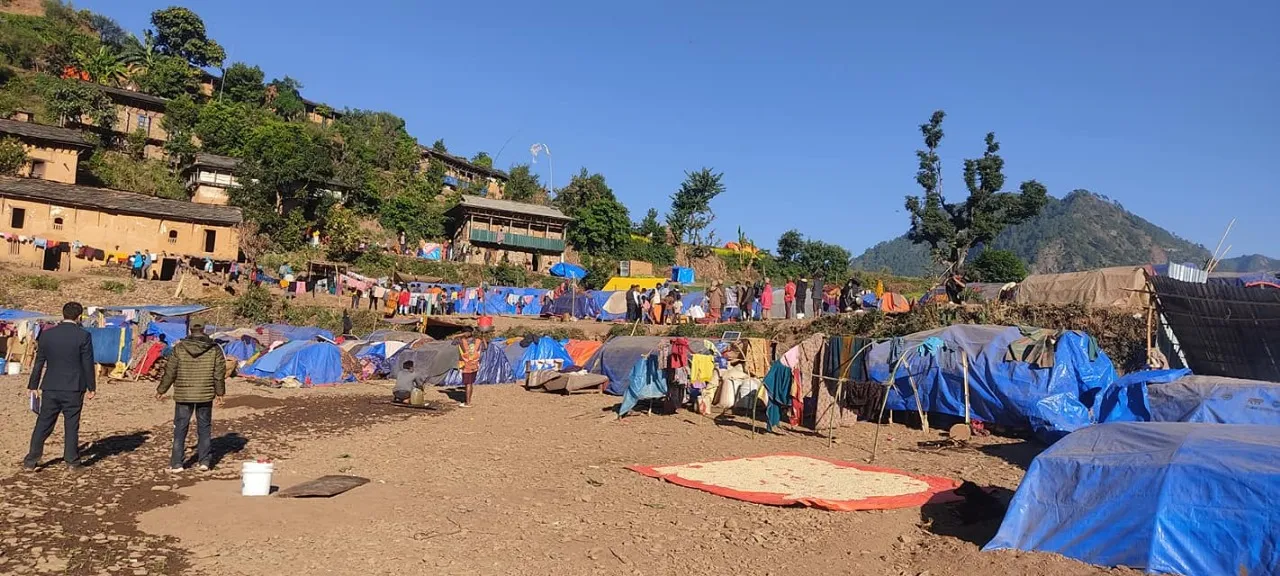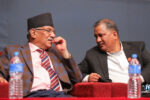RUKUM WEST: Sindu Malla, a Grade 8 teacher at Jana Bikash Higher School in Rukum West in Aathbiskot Municipality, continues her routine despite the haunting memories of the earthquake that struck on the night of November 3.
The school, which reopened on November 4, serves as a beacon of normalcy, but the specter of seismic tremors lingers both at home and in the classrooms.
While Sindu manages to attend school regularly, she reflects the sentiments of her students.
The fear instilled by the earthquake has cast a shadow over their enthusiasm for learning.
Bipin Malla, a grade 5 student, articulates a shared sentiment, revealing that even though he attends school regularly, the pain of losing a friend in the earthquake haunts him, making reading and writing arduous tasks.
Pustak Chand, a grade 8 student, voices concerns about the challenges posed by the winter season, making it difficult for students to cope with both accommodation and studies in the temporary learning centers.
Despite initiating teaching through these makeshift centers, the struggle persists for the seven established in the school.
Principal Deepak Sangam Thapa sheds light on the profound challenges faced by the school.
The earthquake on November 3 wreaked havoc, completely destroying eight rooms in two schools and rendering the remaining three buildings unsafe.
The school, spanning Kindergarten to Class 10, witnessed the tragic loss of three students—14-year-old Prema Malla and Biraj Malla, both in class 8, and 11-year-old Chandrakala Khadka in class 5.
In the aftermath, the school not only grapples with physical damage but also strives to mend the emotional wounds of the students.
Principal Thapa acknowledges the hurdles in managing and facilitating effective learning despite the commencement of teaching in temporary centers.
The resilient spirit of Sindu Malla, her fellow educators, and the students of the school epitomizes the unwavering commitment to rebuilding education amidst the ongoing trauma caused by the earthquake.
Thapa, addressing the profound impact of the earthquake on students, reveals a disturbing trend of isolation, heightened fear of death, and a reluctance to study.
Many students exhibit a tendency to leave school early, succumbing to truancy. Some, unable to endure the environment, are sent home after psycho-social counseling.
Thapa estimates that it may take another year for students to fully reintegrate into their pre-earthquake school routine.
Beyond traditional academics, efforts are made to uplift student morale by incorporating external topics.
Thapa emphasizes the need for specialized psycho-social counseling, as conventional methods fall short in reaching the students.
Compounding the challenges is a lack of drinking water in the school premises, a consequence of the earthquake.
Teacher Sunil Malla, while acknowledging organizational support, highlights the ongoing need for academic materials and warm clothing for the students enduring the harsh cold.
Despite a student population of 315, attendance remains low due to persistent fears related to the earthquake.
In response to the damaged school building, teaching now takes place in 139 temporary learning centers in Athabiskot municipality.
Rabi KC, chief of Athabiskot, discloses that psycho-social counseling is being provided alongside regular lessons in these makeshift environments.
He asserts that an additional month of counseling services is crucial for a complete return to the old school routine.
Despite the school’s operational status since November 3, effective teaching and learning remain elusive.
The focus is on making the educational process more impactful, with plans to compensate for lost time during winter holidays and other events.
KC underscores the commitment to completing the students’ curriculum once they return to their original schools, acknowledging the ongoing challenges and the collective effort to overcome them.
Tara Prakash Pun, Head of the Education Development Coordinating Unit, reveals that the ongoing educational efforts are being conducted from 213 temporary learning centers spread across the district.
The impact of the earthquake is stark, with 544 classrooms in 18 schools suffering damage, along with 38 toilets.
He further discloses the human toll, stating that 18 students and one school employee lost their lives in the district due to the earthquake.
Additionally, one student and one teacher sustained injuries. The Social Development Office confirms that a total of 11,952 students have been adversely affected by the seismic event.
In the aftermath of the 6.4 magnitude earthquake that struck Ramidanda Center in Jajarkot on the night of November 3, a significant number of students in Rukum West and Jajarkot find themselves compelled to pursue their studies in temporary learning centers and open classrooms.
The quake has left a lasting imprint on the educational landscape, necessitating resilient efforts to rebuild and restore a semblance of normalcy for the affected students.









Comment